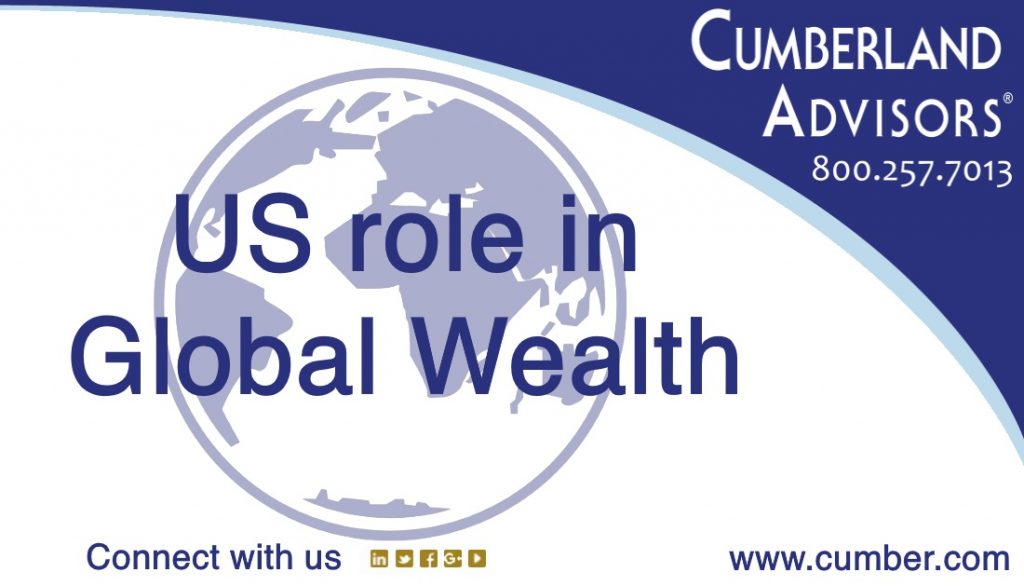“The U.S. accounts for more than a third of the $8 trillion in assets held globally by ultrahigh-net-worth individuals, those with $20 million to invest, according to Boston Consulting. UBS reckons there are probably even more rich individuals in the U.S. than surveys suggest. ‘A tendency to keep businesses private for longer before listing on public markets means that wealth creation is underreported,’ according to the Swiss bank’s billionaires report, released in October.”—Sonali Basak (“The $200 Trillion Gold Rush That Has Reshaped Private Banking,” https://www.bloomberg.com/news/features/2018-11-24/the-200-trillion-gold-rush-that-has-reshaped-private-banking)

A few things jumped out at me when I read the Bloomberg assessment of global wealth linked above.
First is the major role of the United States in the concentration of wealth globally, which affirms, for me, the extraordinary power of our country and how it dwarfs the others. I believe that we achieve this relative standing because our system, with all its flaws, protects property better than the others do and because our institutional transparency, with all its flaws, is greater than the others’.
Add to that a free press, with all its flaws, and an independent judiciary, with all its flaws, and we arrive at the worldwide view that the US, with all its flaws, is the best, or at a minimum, the least worst place to hold one’s wealth and custody one’s assets.
The second issue is more nuanced. Market agents vote with their feet and their wire transfers. The shifting of assets among the jurisdictions in the Bloomberg list is important to track if an investor is making a global asset allocation. Many investing models perform global allocations and may be reducing their relative performance by doing so. Their errors are often costly, whether those are allocations to newcomers like Bitcoin or to more traditional overweighted emerging markets, made because some pie chart formula says to do it.
At Cumberland we are US-based and US securities markets-focused. So the starting point for our work lies within the $8 trillion slice of what Bloomberg identified. In our system, we operate under American law. And now we want to go a little deeper into the weeds to discuss the few billion of that 8 trillion that we actually have under management.
We don’t mix brokerage (commissions) with advising. We are fee-for-service only. And we don’t take custody of assets. We believe that this “three silos” approach is the safest construction against a Madoff-type invasion. We advise all investors to think about this approach.
We do manage those assets, and we do that with specific investment objectives, articulated in a written policy statement. Our job is to make the buy, sell or hold decisions within the investment objectives.
We also do not use lockouts and impediments to block a client from obtaining their assets. Any client can fire us at any time and for any reason. Cumberland has clients in over 40 states, with over 2500 portfolios, and every one of them is with us because they choose to be.
One final thought. We conform to the Global Investment Performance Standards (GIPS). We are independently audited for GIPS compliance. We are a private firm. A significant portion of our shareholders are managers and key employees. We have no debt. Our ADV disclosure is transparent.
The Bloomberg global inventory added up how many people and how much they own in assets. The details of deployment of those assets is left to each investor and market agent.
Readers can ponder. Do you want an independent and audited GIPS-verified manager? Do you consider matching your liabilities with your assets, or do you blindly follow a pie chart? Do you expose your wealth to lockouts and opacity?
We are entering into the final month of a volatile year. Pondering such questions is recommended. What Bloomberg has identified at the link above is only a starting point.
David R. Kotok
Chairman and Chief Investment Officer
Email | Bio
Links to other websites or electronic media controlled or offered by Third-Parties (non-affiliates of Cumberland Advisors) are provided only as a reference and courtesy to our users. Cumberland Advisors has no control over such websites, does not recommend or endorse any opinions, ideas, products, information, or content of such sites, and makes no warranties as to the accuracy, completeness, reliability or suitability of their content. Cumberland Advisors hereby disclaims liability for any information, materials, products or services posted or offered at any of the Third-Party websites. The Third-Party may have a privacy and/or security policy different from that of Cumberland Advisors. Therefore, please refer to the specific privacy and security policies of the Third-Party when accessing their websites.
Sign up for our FREE Cumberland Market Commentaries
Cumberland Advisors Market Commentaries offer insights and analysis on upcoming, important economic issues that potentially impact global financial markets. Our team shares their thinking on global economic developments, market news and other factors that often influence investment opportunities and strategies.a

